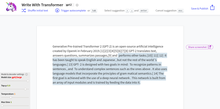Motives

Some scientists, such as Stephen Hawking and Stuart Russell, have articulated concerns that if advanced AI someday gains the ability to re-design itself at an ever-increasing rate, an unstoppable "intelligence explosion" could lead to human extinction. Musk characterizes AI as humanity's "biggest existential threat." OpenAI's founders structured it as a non-profit so that they could focus its research on creating a positive long-term human impact.
Musk and Altman have stated they are motivated in part by concerns about the existential risk from artificial general intelligence. OpenAI states that "it's hard to fathom how much human-level AI could benefit society," and that it is equally difficult to comprehend "how much it could damage society if built or used incorrectly". Research on safety cannot safely be postponed: "because of AI's surprising history, it's hard to predict when human-level AI might come within reach." OpenAI states that AI "should be an extension of individual human wills and, in the spirit of liberty, as broadly and evenly distributed as possible...", and which sentiment has been expressed elsewhere in reference to a potentially enormous class of AI-enabled products: "Are we really willing to let our society be infiltrated by autonomous software and hardware agents whose details of operation are known only to a select few? Of course not." Co-chair Sam Altman expects the decades-long project to surpass human intelligence.
Vishal Sikka, former CEO of Infosys, stated that an "openness" where the endeavor would "produce results generally in the greater interest of humanity" was a fundamental requirement for his support, and that OpenAI "aligns very nicely with our long-held values" and their "endeavor to do purposeful work". Cade Metz of Wired suggests that corporations such as Amazon may be motivated by a desire to use open-source software and data to level the playing field against corporations such as Google and Facebook that own enormous supplies of proprietary data. Altman states that Y Combinator companies will share their data with OpenAI.
In 2019, OpenAI became a for profit company called OpenAI LP to secure additional funding while staying controlled by a non-profit called OpenAI Inc in a structure that OpenAI calls "capped-profit", having previously been a 501(c)(3) nonprofit organization.
Comments
Post a Comment